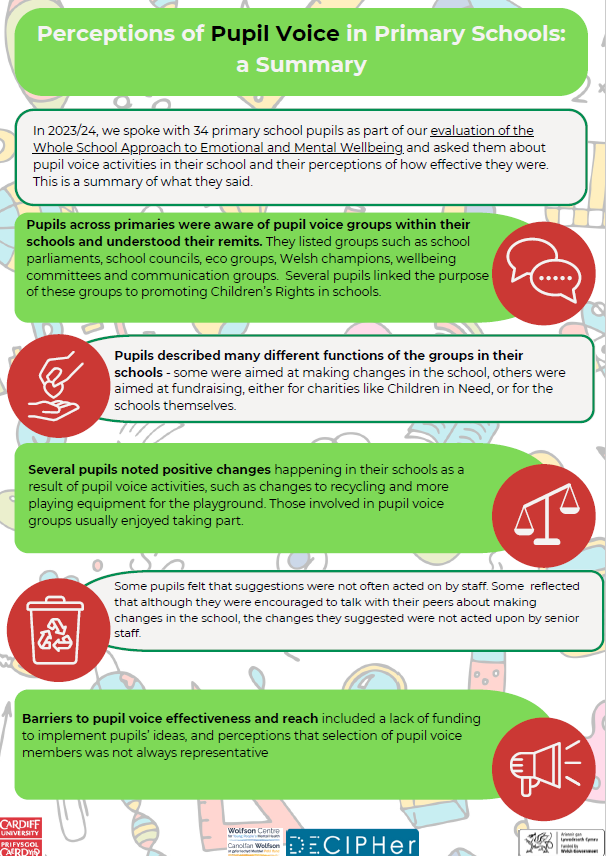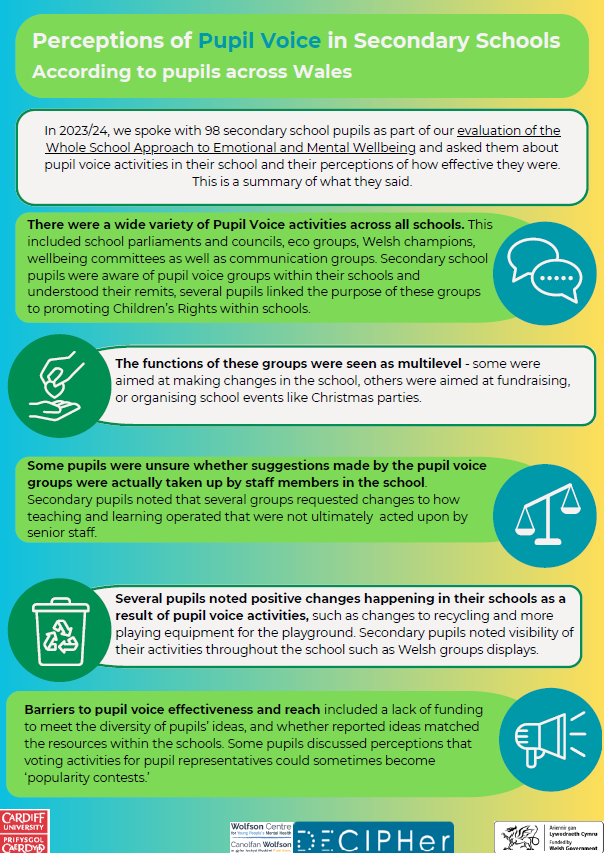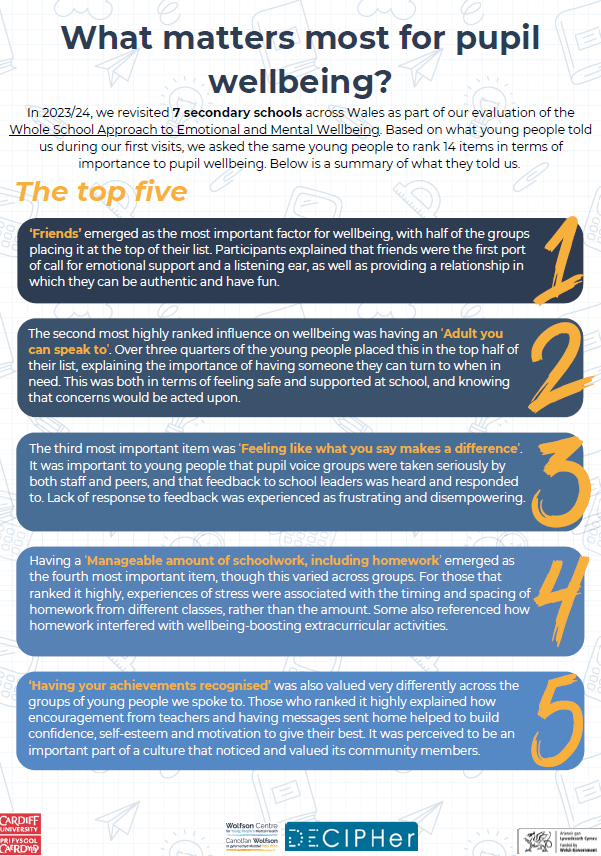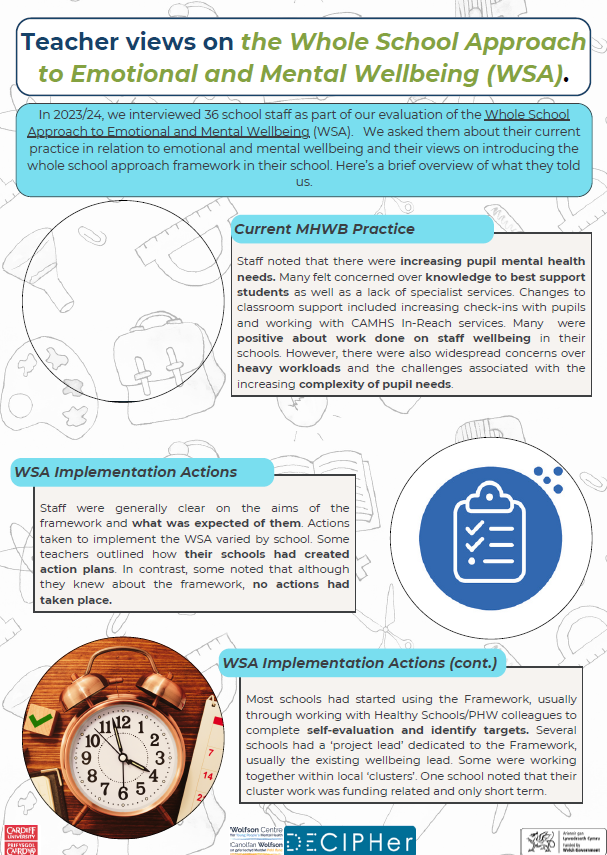
As part of their evaluation of the Whole School Approach to Emotional and Mental Well-being, DECIPHer researchers asked pupils and teachers in both primary and secondary schools about well-being.
Here are their findings
In 2021, Welsh Government issued the Framework embedding a whole school approach to emotional and mental well-being (WSA) as statutory guidance for schools. DECIPHer researchers working in the Wolfson Centre for Young People’s Mental Health are carrying out evaluations into this framework and have identified some key findings.
In 2023/24, researchers spoke with 34 primary school pupils and 98 secondary school pupils as part of their evaluation, to ask them about voice activities in their schools and how effective they are. Whilst pupils told researchers there were positive changes happening as a result of these voice activities, there were still some barriers to the effectiveness and reach.
Based on these visits, researchers revisited seven secondary schools to ask the same young people to rank 14 items in terms of their importance to their well-being. You can find a summary of the top five below, along with a poster detailing the full rankings.
Teachers were also interviewed as part of this evaluation. Researchers talked to 36 school staff about their current practices in relation to emotional and mental well-being and their views on introducing this framework into their school. The teachers discussed factors which supported and challenged the implementation of this framework, and how the WSA aligned with their existing practices. You can read the posters below for a more detailed overview of these interviews.
Primary school pupils
- Pupils across primary schools were aware of pupil voice groups within their schools and understood their remits.
- Pupils described many different functions of the groups in their schools.
- Several pupils noted positive changes.
- Barriers to pupils voice and effectiveness to reach included lack of funding to implement ideas.
Secondary school pupils
- There were a wide variety of pupil voice activities across all schools.
- The functions of these groups were seen as multilevel.
- Some pupils were unsure whether suggestions made by the pupil voice groups were actually taken up by staff members in the school.
- Several pupils noted positive changes happening in their schools as a result of pupil voice activities.
- Similarly to primary school pupils, secondary school pupils identified barriers to their voice effectiveness and reach due to a lack of funding to meet the diversity of their ideas.
What matters most for well-being?
The five most popular answers:
- Friends
- An adult they can speak to
- Feeling like what the pupils say makes a difference
- Having a manageable amount of schoolwork – including homework
- Having their achievements recognised
Teachers’ views
- There are increasing pupil mental health needs, and concerns with staff well-being associated with complexity and pupil mental health needs.
- Staff were clear on the aims of the framework. Some schools created action plans, in contrast to other schools where no actions had taken place.
- Supporting factors: Relationships (particularly with the PHW area lead) were viewed as key to starting up the framework.
- Challenges: Barriers included the lack of time and resource pressure, such as staffing.
- Alignment with existing practice: The framework was consistent with and validated existing initiatives.
Lead Investigator Dr Rachel Brown said:

We revisited our participating schools a year after our first visit to check in on how they were doing and to discuss implementation of the whole school approach framework. School staff told us that many of the issues we discussed last year were still a challenge, including high rates of more complex problems among learners, as well as lack of time and resources to support mental well-being.
For the Framework, most schools were at some stage of delivery and support from WSA area leads was helpful. We also spoke to learners about their views on what mattered most for well-being. Friends, a trusted adult and feeling listened to were most important, with most learners identifying an adult they felt they could go to if needed. Views on pupil voice were quite mixed, with some seeing real changes in their school as a result and others feeling it was ineffective. We’ll continue to analyse the data and publish results, as well as presenting to a future SHRN webinar.
The posters can be viewed below:
Further reading
Changes and challenges: How are teachers experiencing well-being in schools?
Safe as… schools? Where and with whom do pupils feel most secure?
Welsh Government Framework on Embedding a Whole School Approach to Emotional and Mental Wellbeing
Blog: Taking a whole school approach to mental health in Wales




